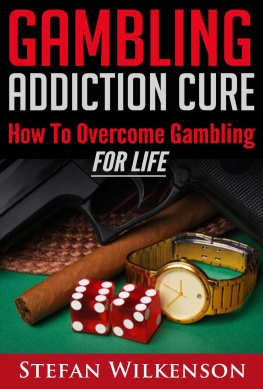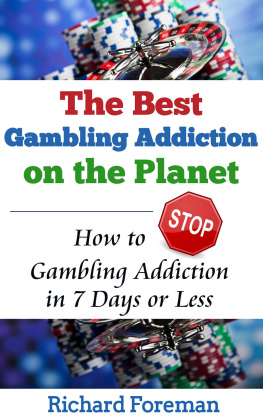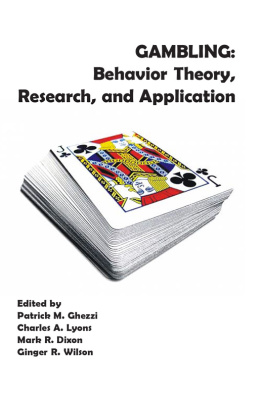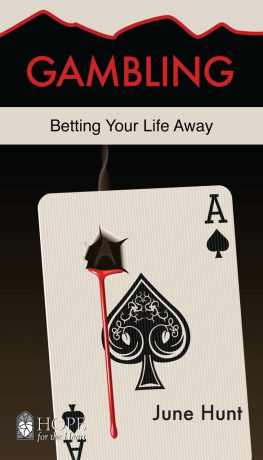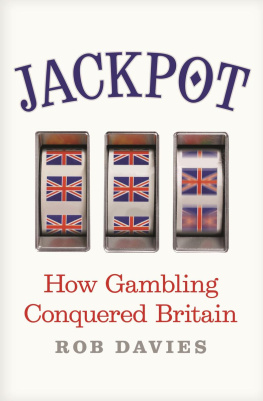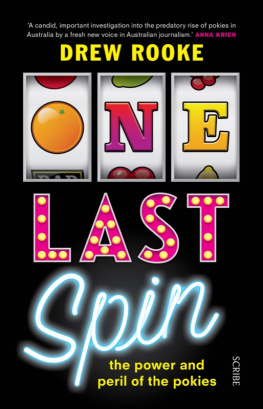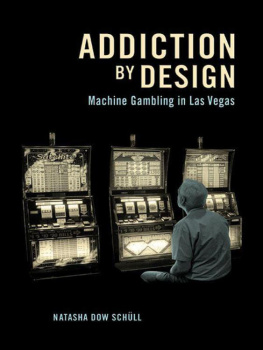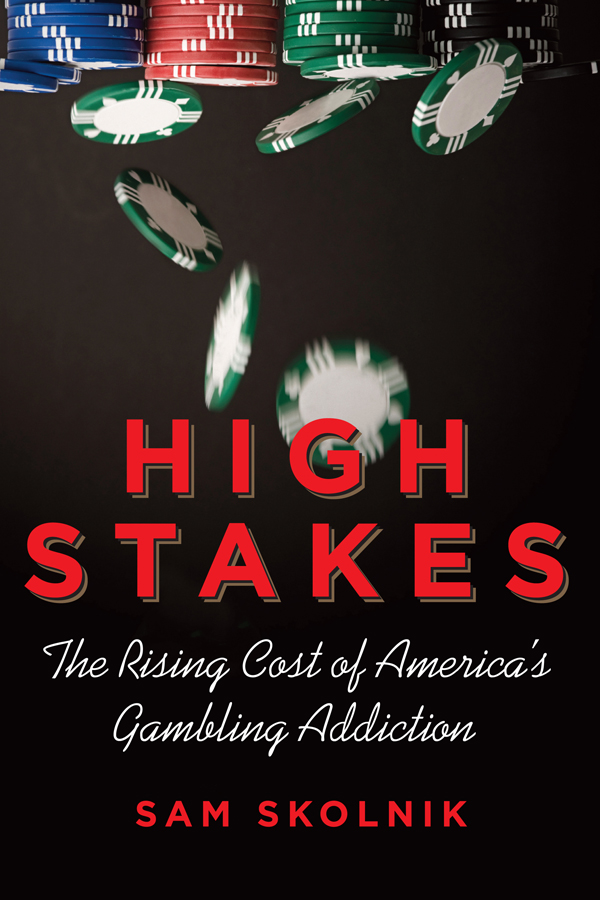High Stakes
The Rising Cost of Americas Gambling Addiction
Sam Skolnik
Beacon Press
Boston
To my parents
and
To all the gamblers out there,
including those in recovery
Contents
Axel: Double it.
Dealer: You want to double on eighteen, sir?
Axel: Yes. Give me the three.
Axel Freed in The Gambler , written by James Toback (1974)
Introduction. A Gamblers Journey, and a Countrys
I started gambling seriously in 2000, the year I moved to Seattle for a newspaper job. By 2001, I was hooked. Ive been grappling with a poker addiction ever since.
While Ive had some happier times at the poker tables recently, during the past decade gambling has often wreaked havoc with my life. I dont know if Ive hit bottoma term many in the recovery community rightly detestbecause I dont know what, for me, bottom is.
There are things Ive never done because of my habit. Ive never borrowed from a loan shark or bet with a bookie. Ive never stolen anything to raise gambling funds. Ive never missed filing my taxes. Ive never been kicked out of my apartment because I couldnt pay the rentthough God knows how many times Ive been days and even weeks late. Ive never let work slide so badly that it caused me to be fired.
But there are lots of ways in which my gambling affected me for the worse during my six years in Seattle and more recently in Las Vegas:
Ive left bills unpaid, sometimes for weeks, months, or years. Ive had credit cards canceled and had creditors harass me with phone calls at all hours, sometimes leaving me screaming at the walls.
Ive borrowed incessantly, both to raise poker funds and to pay bills. I borrowed at least five times against my old 1991 Miata, in the end, undoubtedly borrowing much more than the car was actually worth. Ive borrowed simultaneously from five different payday loan stores in Seattle and later from four in Las Vegasall at usurious rates.
Several times when the losses mounted and funds were especially tight, Ive survived for days on end on boxes of store-brand mac and cheese, ramen noodles, saltines, and seltzer water.
Ive never been arrested, but I have been pulled over by police several times in Washington and Nevada because of expired license plate tabs. In Vegas, where the utility companies dont mess around, Ive had both my phone service and my power briefly shut off.
There have been instances when Ive been less productive at work than I needed to be. And Im not as ambitiousor I should say, Im not as ambitious with regard to my journalism careeras I used to be or still ought to be. My career dreams have largely shifted from Pulitzer Prizes to World Series of Poker gold bracelets.
Perhaps worst of all, Ive been missing out on some basic human connections. Ive let some friendships and family relationships wither, and Ive surely missed making new friends. And Ive dated and pursued serious girlfriends less energetically than I used to. Some of that might be a function of impending middle age, but much of it, without doubt, is due to poker.
I still play, but I dont know what my gambling future holds. Its my hope that Ill be able to find a way to reinvigorate my life through reduced time at the poker tables. Quitting for good is one option and is something I recognize may ultimately be the answer. To do that, Gamblers Anonymous undoubtedly will need to be a big part of the equation. Another option is to do nothing, to continue to play regularly, no matter where I live. After all, its becoming more and more difficult to find a region of the country not within easy driving distance from a legal poker room. Regardless of where I end upand Im thinking staying in Las Vegas is not the answer for me, for many reasons on top of the ubiquitous gamblingI just cant envision this option B being a palatable long-term choice.
Im currently leaning toward a third option, one espoused by two writers who each released gambling memoirs in the last few years, Martha Frankel and Burt Dragin. Both had developed serious gambling problemsFrankel through Internet poker (something that thankfully has never held much appeal for me) and Dragin through regular trips to casinos. Neither ended up in recovery. Instead, both say their answer has been to limit their gambling to a weekly poker game with friends and reasonable stakes.
[T]his game is social and relaxing, not compulsive and fearful, wrote Frankel, a celebrity profiler for magazines, in her 2008 book Hats & Eyeglasses: A Family Love Affair with Gambling. It reminds me of the fun that I had when I first started playing, and how much I love poker. And it shows me that Im no longer out of control, fighting a dragon I could never slay.
Maybe this kind of solution could work for me, with a trip or two to Vegas every year tacked on for good measure. Maybe its pie-in-the-sky thinking. I dont yet know.
Its not easy to write these things. Theres a certain shame attached to confessing a gambling addiction in our culture, even more so than copping to being an alcoholic or a cocaine addict. Many still believe that people gamble excessively because of a lack of willpower or because theyre simply immoral. These antiquated beliefs are beginning to fade, as doctors, scientists, and researchers are increasingly concluding that pathological gambling is a behavioral addiction that affects the brain in much the same way as substance dependencies. I share this notion.
Though research suggests that about one in two problem gamblers suffer other types of addictions, I dont. Except for maybe a few beers a week, I dont drink. Illegal drugs generally scare the daylights out of me. Pot doesnt, but I havent taken a toke in more than a decade and have no interest in it. I drink less coffee and Diet Coke than your standard card-carrying reporter, and Ive never touched tobacco aside from the rare cigar. Except for an unhealthy fondness for thin-crust pepperoni pizza, Im not a food addict, nor do I shop, spend, work, or have sex anywhere near too much. For me, its just about the gambling.
Im not sharing this highly personal information because this book is about me. It isnt. But my perspective has been shaped by my experiences inside casinos and poker rooms, as well as the recovery meetings Ive attended sporadically over the years in church basements and community centers. Readers deserve to know my history on the topic.
Certainly, but for my habit, I never would have pursued writing this book.
Yet if anything, Im even more interested in the topic as a reporter. Several years ago while living in Seattle, I realized there was an important, untold story about the rise of problem gambling in Washington state. Over the last twenty years, several regional newspapers have chronicled how sudden infusions of gambling have impacted their cities and states. I wrote one of those accounts in 2004, in a three-day, front-page series for the Seattle Post-Intelligencer .
Ever since, Ive felt that a book urgently needed to be written that investigated the consequences of our gambling boomhow we, as a nation, are in many ways gambling with our collective future. Studies suggest there are likely millions out there like mepeople who have gotten caught up in gamblings grip, mostly or entirely as a result of the spread of legalized gambling over the last several decades. These numbers include many who never would have developed gambling problems if casinos and other gambling businesses hadnt been allowed to plant themselves in their communities.
And yet, incredibly to me, no one to date has written this larger national tale, at least not since 1995, when author Robert Goodman published his critically acclaimed treatise called The Luck Business: The Devastating Consequences and Broken Promises of Americas Gambling Explosion. Since then, legalized gambling throughout America has only grownexponentially.


